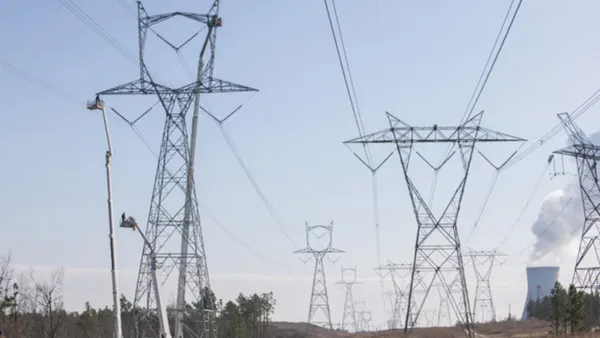Dive Brief:
- The New Hampshire Site Evaluation Committee (SEC) yesterday unanimously rejected the Northern Pass transmission project, throwing the project's future into doubt.
- Owned by Eversource Energy, the 192-mile transmission line would move power from Hydro-Quebec dams in Canada to a substation in Deerfield, N.H. Just last week, Massachusetts selected the project to help achieve the state's clean energy goals.
- Once a final report is issued, project developers can appeal the decision and then potentially take the case to the state's Supreme Court. Northern Pass officials previously said an appeal was possible if the project was rejected; local media reports the company is "shocked and outraged" by the SEC's decision.
Dive Insight:
The New Hampshire SEC's decision to reject Northern Pass came as a surprise yesterday, only a week after Massachusetts gave the project a green light and a major role in its energy plans.
The project has sparked backlash from residents in New Hampshire, and a lawyer for the siting board reportedly said that Eversource had failed to prove the transmission would not "unduly interfere with the orderly development of the region."
It is not clear yet what the decision will mean for the project. Even if Northern Pass appeals and ultimately wins, the process could set the project behind schedule. An expedited schedule is one reason Massachusetts selected the line — its schedule was two years shorter than other proposals.
A spokesperson for the Massachusetts Attorney General said yesterday the decision "raises serious questions about this timetable." That announcement follows Healey's calls for an investigation into the process used to select Northern Pass.
"At a minimum, it appears today's development requires re-evaluation of the selection of Northern Pass," Chloe Gotsis, a spokeswoman for Attorney General Maura Healey, said in a statement. "The Attorney General's Office remains committed to an open and transparent review and we will be following this closely."
The Massachusetts Office of Energy and Environmental Affairs also indicated the Northern Pass selection is contingent on it receiving other required approvals.
"Massachusetts’ recently selected clean energy procurement project remains conditional on necessary siting approvals," the department said in a statement, "and EEA will continue to monitor and evaluate developments in New Hampshire as the administration works to ensure a clean and affordable energy future that progresses toward greenhouse gas emissions reductions."
As proposed, the transmission line would begin at the Canadian border in Pittsburg, N.H., and extend 192 miles to the point where it connects to the New England electric grid. Sections of the line will also be buried along roadways to reduce the impact of views around the White Mountain National Forest, and owners say the line would run more than 80% along existing transmission corridors to mute its impact.
Two years ago, Massachusetts lawmakers passed a bill to bring new sources of clean energy to the state by 2020. Once completed, Northern Pass would supply 9,450,000 MWh of renewable energy annually, boosting Massachusetts' electricity supply to almost 50% clean energy.














